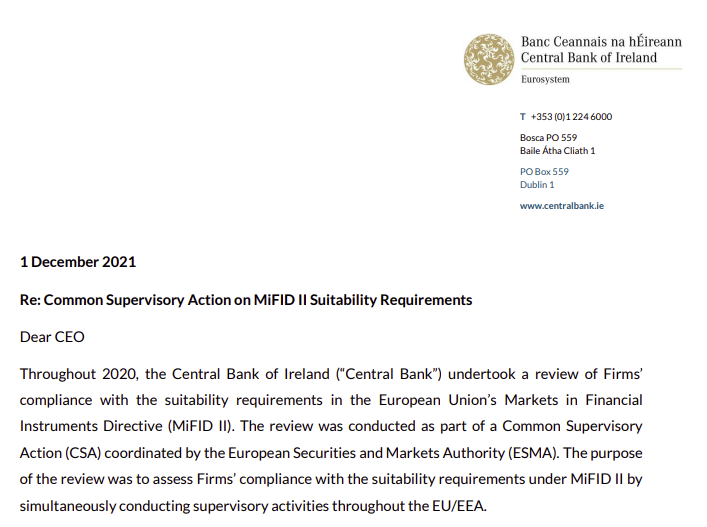AuthorPeter Oakes is an experienced anti-financial crime, fintech and board director professional. Archives
January 2025
Categories
All
|
Back to Blog
Editor's note: The day after this Guidance on Operational Resilience was issued, the Central Bank of Ireland fined Bank of Ireland €24.5mn for significant IT control failures. In the statement released by the CBI it said the following on operational resilience: 1) "Firms and their boards are responsible for having an effective IT service continuity framework and associated internal controls. These are core parts of a firm’s operational resilience and will continue to be an area of focus as part of the Central Bank’s and the European Central Bank’s supervisory strategy." 2) "This case is an example of robust enforcement action where failures expose consumers and the financial system to serious potential risk. The Central Bank expects boards and senior management of firms to implement and operate robust risk and control frameworks which recognise and address risk issues in a timely way as part of an effective risk culture. This is a core element of operational resilience designed to protect consumers and ensure financial stability.” The Central Bank published the Cross Industry Guidance on Operational Resilience in December 2021 following consultation where responses were received from a wide number of industry bodies and regulated entities. The objective of this Guidance is to communicate to industry how to prepare for, respond to, recover and learn from an operational disruption that affects the delivery of critical or important business services. The Guidance aims to enhance operational resilience and recognise the interconnections and interdependencies, within the financial system, that result from the complex and dynamic environment in which firms operate. More specifically, the purpose of the Guidance is to:
Three Pillar of Operational Resilience The Cross Industry Guidance on Operational Resilience is built around three pillars of Operational Resilience:
These three pillars support a holistic approach to the management of operational resilience and related risks and create a feedback loop that fosters the perpetual embedding of lessons learned into a firm’s preparation for operational disruptions.
0 Comments
Read More
Back to Blog
CompliReg is a leading provider of consultancy services to MiFID, Payments and Emoney firms. Our founder, Peter Oakes is an independent non-executive director of two Central Bank regulated MiFID firms, an emoney firm and a payments firm. Peter is a member of the Audit, Risk, Nomination, Remuneration and Internal Audit Committees of a number of firms. Read more about his NED services and CompliReg's services. UPDATE 22/04/2022: If below below on suitability requirements is of interest, then you should also look at our post of 22 April 2022 on the Central Bank's review findings on issues in marketing of complex investment products. Central Bank review finds firms providing investment services need to improve suitability assessments
The Central Bank of Ireland has published a Dear CEO letter outlining the findings of a review of investment firms’ compliance with the suitability requirements under MiFID II. The review was conducted as part of a Common Supervisory Action (CSA) coordinated by the European Securities and Markets Authority (ESMA). The purpose of the review was to assess firms’ compliance with the suitability requirements under MiFID II by simultaneously conducting supervisory activities throughout the EU/EEA. The findings, which are highlighted in ESMA’s recent public statement, incorporate the findings from the Central Bank’s own supervisory analysis, and engagement with other National Competent Authorities (NCAs). When providing investment advice and/or portfolio management, Firms are required to take all reasonable steps to ensure that a client’s investments align to their objectives and personal circumstances. This is a key measure to protect investors from the risk of purchasing unsuitable products. The review identified evidence of positive practices, particularly where firms took a personalised and comprehensive approach to suitability assessments for their clients. However, it also identified instances where further action is required by firms. For example:
The Central Bank will continue to engage with firms where specific supervisory actions have been imposed, which require firms to take specific action on foot of our findings. In addition, the Central Bank is requiring all Irish authorised MiFID firms and credit institutions, who provide portfolio management and advisory services to retail clients, to conduct a thorough review of their individual sales practices and suitability arrangements. This review must be documented and must include details of actions taken to address findings in the ESMA public statement and this letter. This review should be completed, and an action plan discussed and approved by the board of each firm, by end of Q1 2022. Director of Consumer Protection, Colm Kincaid, said: “Investing in an unsuitable investment product can lead to unexpected losses, which can have devastating consequences for individual investors and their families. Regulated firms play a key role in protecting consumers against this risk. “However, the findings from this review show that regulated firms need to improve their performance when it comes to assessing the suitability of investment products they recommend or advise consumers to purchase. These assessments must be of high quality, based on a good understanding of the customer’s circumstances and capacity for financial loss, and properly documented.” Source: Central Bank of Ireland, 01 December 2021
Back to Blog
"On the whole, I agree with you that there is a limited amount of directorships that can be held with a job being well done." This is around minutes 55-57 (around 2:25pm-2:27pm) at https://media.heanet.ie/page/0382d466362a4d90b07d8e7d7f27fdd9
|
© CompliReg.com Dublin 2, Ireland ph +353 1 639 2971
| www.complireg.com | officeATcomplireg.com [replace AT with @]
| www.complireg.com | officeATcomplireg.com [replace AT with @]



